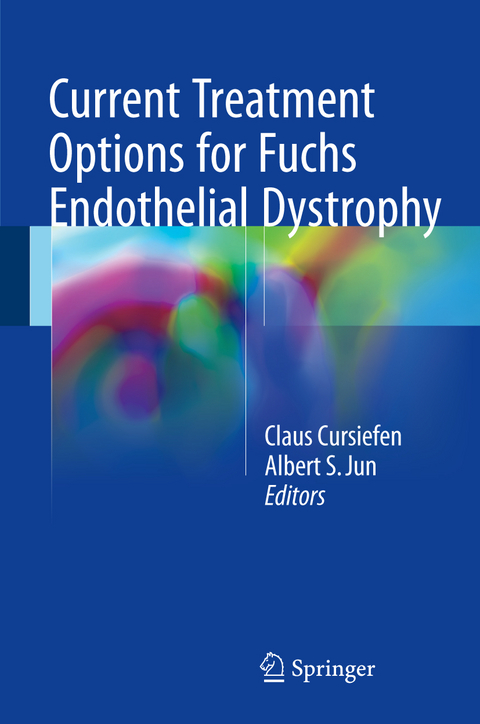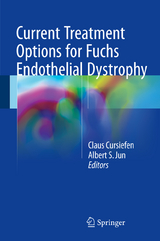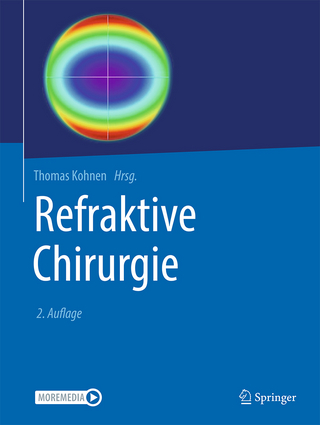Current Treatment Options for Fuchs Endothelial Dystrophy
Springer International Publishing (Verlag)
978-3-319-43019-5 (ISBN)
Claus Cursiefen, MD, PhD, is Chairman and Professor in the Department of Ophthalmology at the University of Cologne, Germany and Adjunct Associate Scientist with the Schepens Eye Research Institute/Harvard Medical School, Boston. After completing his MD thesis at the Department of Anatomy, University of Würzburg, Dr. Cursiefen undertook a residency in the Department of Ophthalmology, Erlangen and a postdoctoral fellowship at the Schepens Eye Research Institute in Boston, MA. His clinical focus encompasses modern lamellar corneal transplant techniques (DMEK, DALK, DSAEK), artificial cornea, ocular surface reconstruction, cataract and glaucoma surgery, curative and refractive laser surgery, and ophthalmo-oncology. Dr. Cursiefen's research has concentrated especially on mechanisms of corneal hem- and lymphangiogenesis and their implications for corneal transplant immunology. He is the author of more than 250 publications in the field, including in PNAS, Journal of Experimental Medicine, Journal of Clinical Investigation, and Nature Medicine. Albert S. Jun, MD, PhD, is a board-certified opththalmologist who works at The Johns Hopkins Hospital, Baltimore, MD, USA, and is Associate Professor of Ophthalmology at The Johns Hopkins University School of Medicine. He is also Associate Professor of Ophthalmology and Vice Chair for Education at the Wilmer Eye Institute. After gaining his PhD from Emory University Graduate School of Arts and Sciences, focusing on Genetics and Molecular Biology, Dr. Jun completed an Ophthalmology Residency at The Johns Hopkins Medical Institutions (1998-2001), a Cornea and External Disease Fellowship at Moorfields Eye Hospital (London, UK) (2001-2), and a Corneal Gene Therapy Research Fellowship at Imperial College School of Medicine (London, UK) (2002). He became a Diplomate of the American Board of Ophthalmology in 2003. In 2013 he received an Achievement Award from the American Academy of Ophthalmology and was International Visiting Professor on the occasion of the 150th Anniversary of the Department of Ophthalmology, Medical University of Graz, Austria. More recently he was International Visiting Professor at the Bowman Corneal Club, Liverpool (UK). Dr. Jun is a member of the editorial board of Cornea: The Journal of Cornea and External Disease. He is lead or co-author of approximately 60 peer-reviewed publications.
Epidemiology and genetic basis of Fuchs Endothelial Corneal Dystrophy.- MicroRNAs in FED: New therapeutic option?.- Clinical phenotypes of Fuchs Endothelial Corneal Dystrophy (FECD), disease progression, differential diagnosis, and medical therapy.- Optical and anatomic changes in Fuchs Endothelial Dystrophy corneas.- Evolution of posterior lamellar keratoplasty: PK-DLEK-DSEK/DSAEK-DMEK-DMET.- DMEK Graft Preparation: eye bank perspective and risk factors for preparation failure.- Donor-tissue splitting and tissue storage for DALK and DMEK surgery.- DSAEK and UT-DSAEK in FED: Step-by-step approach.- DSAEK (not only) in Asian eyes: What glide to use? Optimized insertion techniques.- Intra- and postoperative complications and their management in DMEK.- DMEK: step-by-step surgical approach.- Complications of Descemet Stripping Automated Endothelial Keratoplasty (DSAEK) surgery.- Revision for failed penetrating keratoplasty in FED.- Long-term clear graft survival and chronic endothelial cell loss following posterior lamellar keratoplasty.- Immune reactions and dry eye after posterior lamellar keratoplasty.- Tissue engineering of a healthy corneal endothelium for FECD patients.
"Current Treatment Options for Fuchs Endothelial Dystrophy (Springer), edited by Claus Cursiefen and Albert S Jun, describes the current state-of-the-art of every current and potential treatment modality for FED. ... This book is intended for cornea fellows and cornea specialists who are interested in honing their skills based on the most recent advances in the field." (EuroTimes, April, 2017)
| Erscheinungsdatum | 26.11.2016 |
|---|---|
| Zusatzinfo | VIII, 255 p. 71 illus., 59 illus. in color. |
| Verlagsort | Cham |
| Sprache | englisch |
| Maße | 155 x 235 mm |
| Themenwelt | Medizin / Pharmazie ► Medizinische Fachgebiete ► Augenheilkunde |
| Medizin / Pharmazie ► Medizinische Fachgebiete ► Chirurgie | |
| Schlagworte | complication management • DALK • DMEK • DSAEK • Medicine • Minimally Invasive Surgery • Ophthalmology • Penetrating keratoplasty (PK) |
| ISBN-10 | 3-319-43019-X / 331943019X |
| ISBN-13 | 978-3-319-43019-5 / 9783319430195 |
| Zustand | Neuware |
| Haben Sie eine Frage zum Produkt? |
aus dem Bereich




